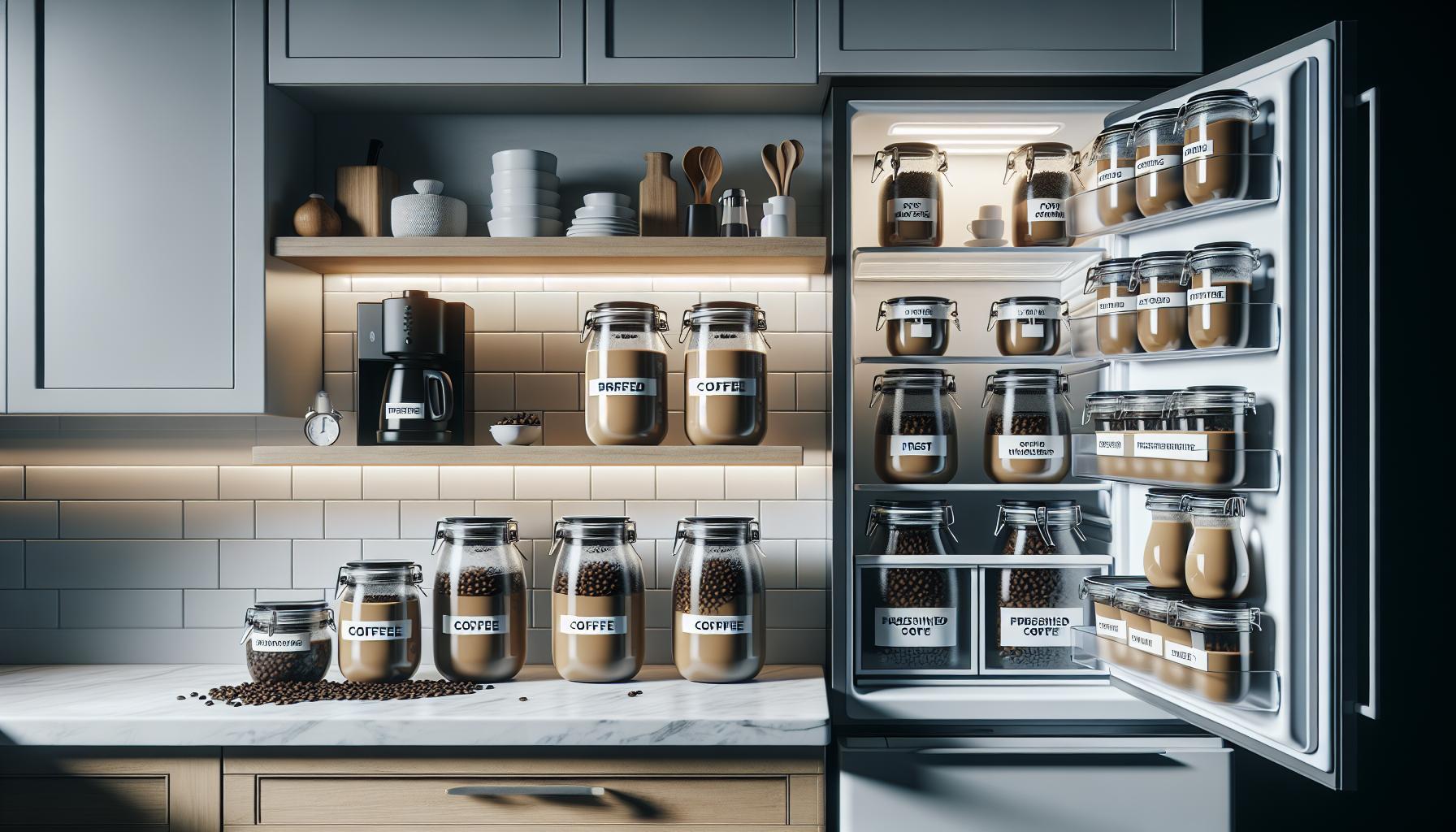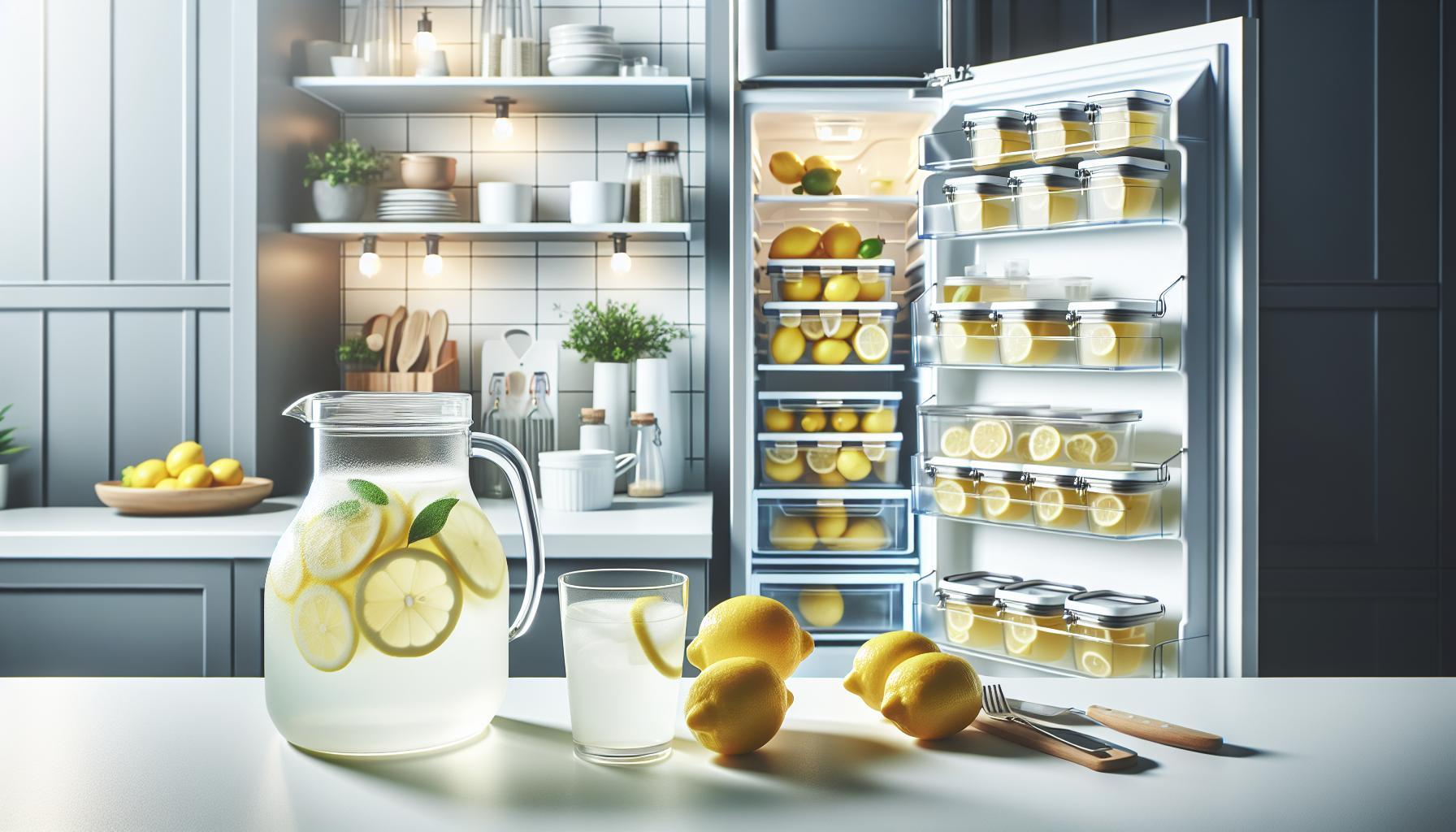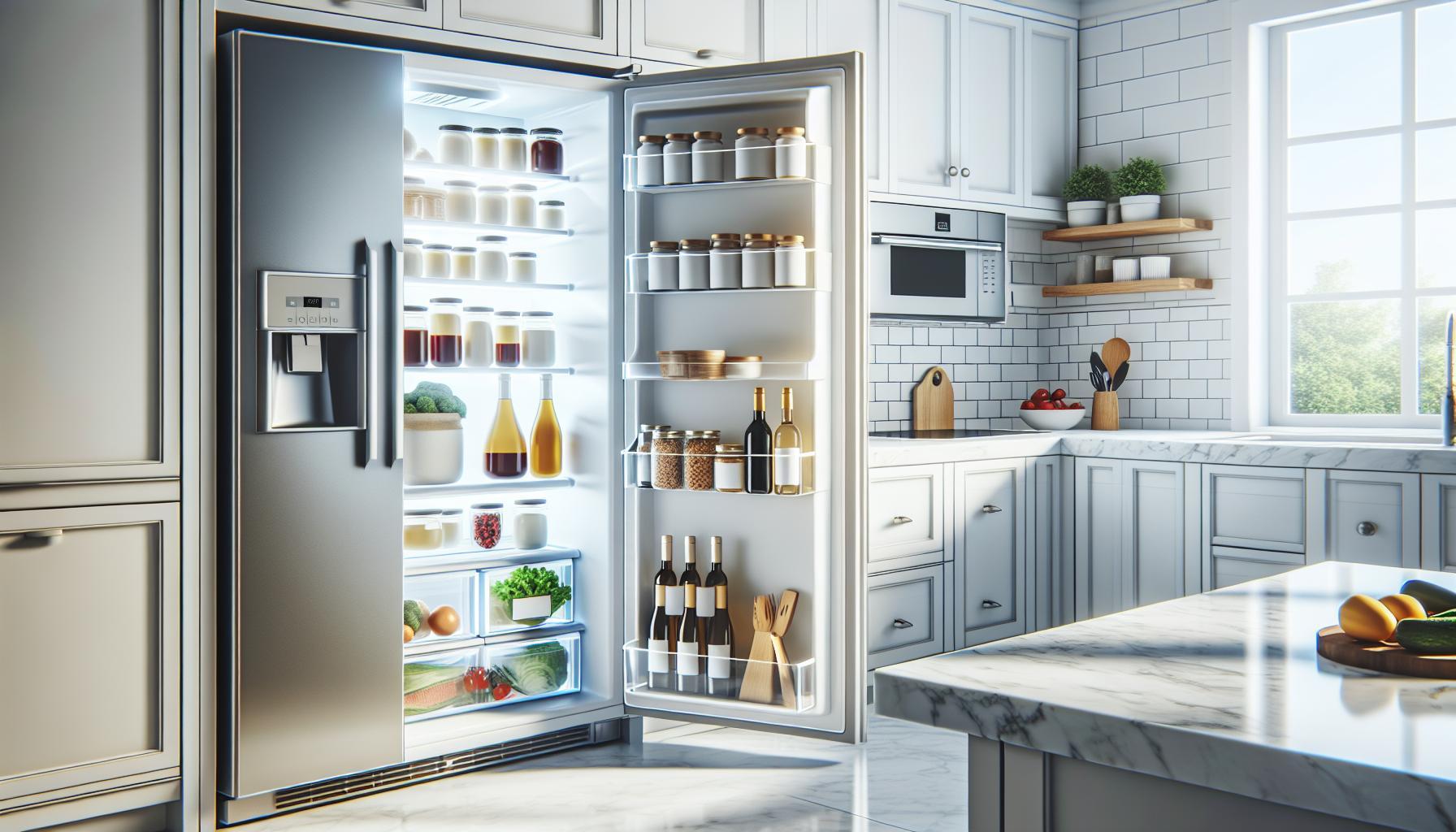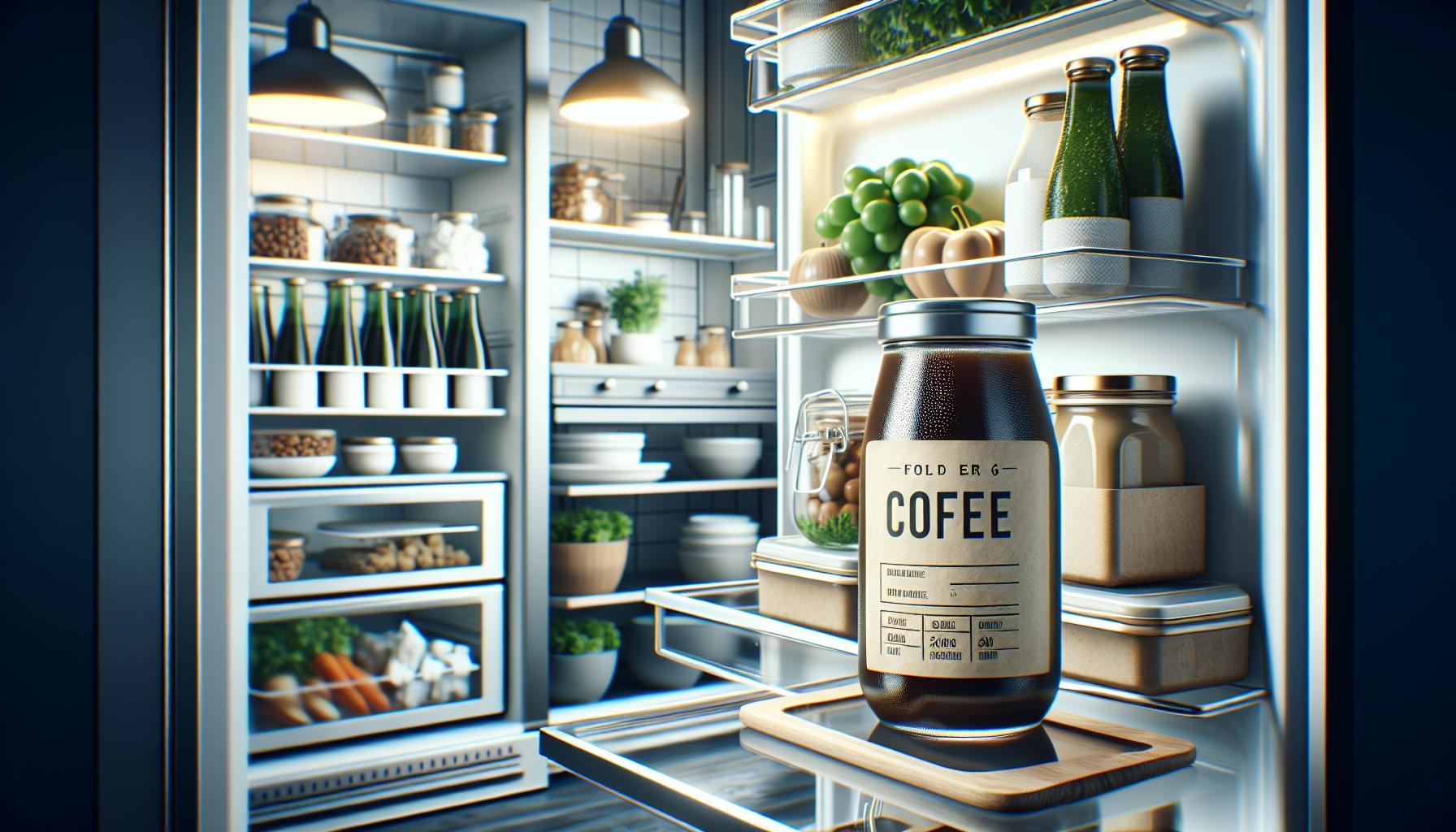Have you ever brewed a fresh pot of coffee, only to wonder how long it will stay good in the fridge? Understanding the lifespan of brewed coffee is crucial, not just for maximizing flavor but also for ensuring food safety. Most experts agree that while coffee can last in the fridge for a week, its taste and aroma diminish significantly after just a few days.
This guide will provide you with practical storage tips, safety guidelines, and the science behind coffee freshness, empowering you to enjoy every drop of your brew. Stay tuned to discover how to keep your coffee tasting its best and when to toss that leftover cup. Your coffee-drinking experience will thank you!
How Long Can Brewed Coffee Be Stored?
Brewed coffee, with its rich aroma and comforting warmth, is often best enjoyed fresh, but sometimes life gets in the way and that pot of java might linger longer than intended. Understanding how long brewed coffee can be stored safely in the fridge is crucial for both flavor retention and food safety. Typically, brewed coffee can be stored in the refrigerator for up to 3 to 4 days. After this time, it may start to degrade in taste and potentially develop off-flavors that can spoil the experience.
When considering storage, the type of container used can play a significant role in preserving freshness. It’s advisable to keep your brewed coffee in an airtight container to minimize exposure to air, which can lead to oxidation and enhance its stale taste. Avoid leaving brewed coffee in the coffee maker’s carafe or an open container, as these methods significantly decrease quality over time. To ensure that you’re consuming your coffee at its best, mark the container with the date brewed to keep track of freshness.
While the timeframe above is generally reliable, always trust your senses. If your coffee has an unusual smell, taste, or appearance, it’s better to err on the side of caution and discard it. Signs that brewed coffee has gone bad may include cloudiness or an off odor; these indicate that it’s time to let go of that once-beloved brew. Keeping these guidelines in mind will help you maximize both the flavor and safety of your delicious morning ritual.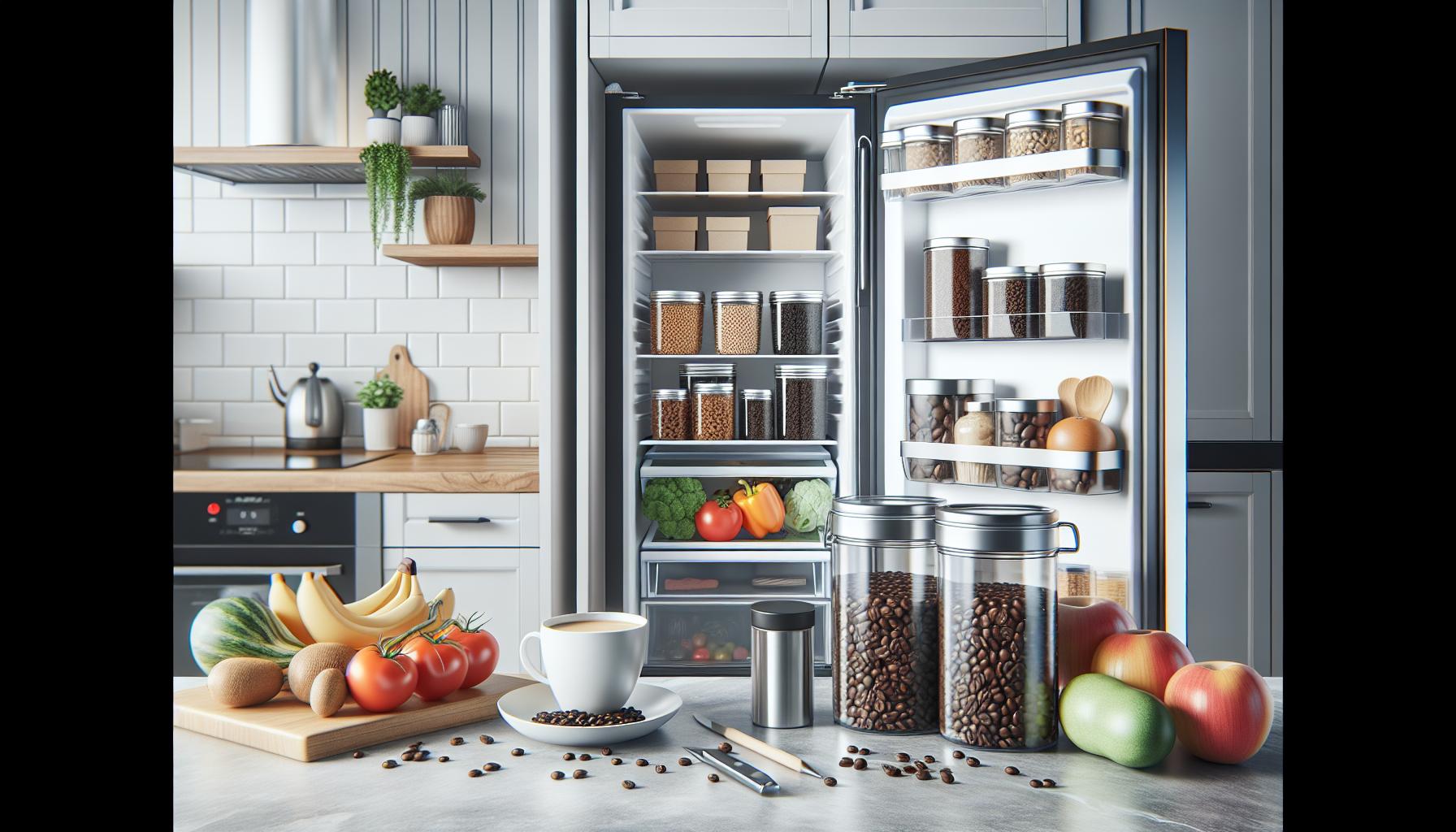
Understanding Freshness: Factors Affecting Coffee Longevity
Brewed coffee is a beloved morning staple for many, but its longevity can be surprising to some. Freshness is a crucial factor in enjoying coffee, and several elements impact how long it retains its optimal flavor and aroma. Understanding these factors can empower you to make better decisions about when to drink your coffee and how to store it effectively.
One significant factor affecting coffee longevity is oxidation. When brewed coffee is exposed to air, the oxygen interacts with the chemical compounds in coffee, leading to a breakdown that diminishes its flavor profile over time. Therefore, using an airtight container is essential. By keeping your coffee sealed, you minimize this exposure and help preserve its taste. Additionally, the temperature at which coffee is stored plays a substantial role; even in the fridge, fluctuations in warmth can lead to degradation in quality.
Light also impacts coffee’s freshness. Ultraviolet rays can break down the oils and flavors in coffee, making dark, opaque containers ideal for storage. Moreover, the initial quality of the coffee beans used is pivotal; high-quality, freshly ground beans will yield better-tasting brewed coffee than older or lower-quality alternatives. Lastly, if additives like milk or sugar are mixed into the brewed coffee, these can introduce variables affecting freshness, potentially speeding up spoilage and altering taste.
To maximize the lifespan of your brewed coffee, apply these best practices: store it in an airtight, opaque container, keep it in the coldest part of your fridge, and consume it within 3 to 4 days. Following these guidelines will help you enjoy your coffee at its best while ensuring safety and flavor retention.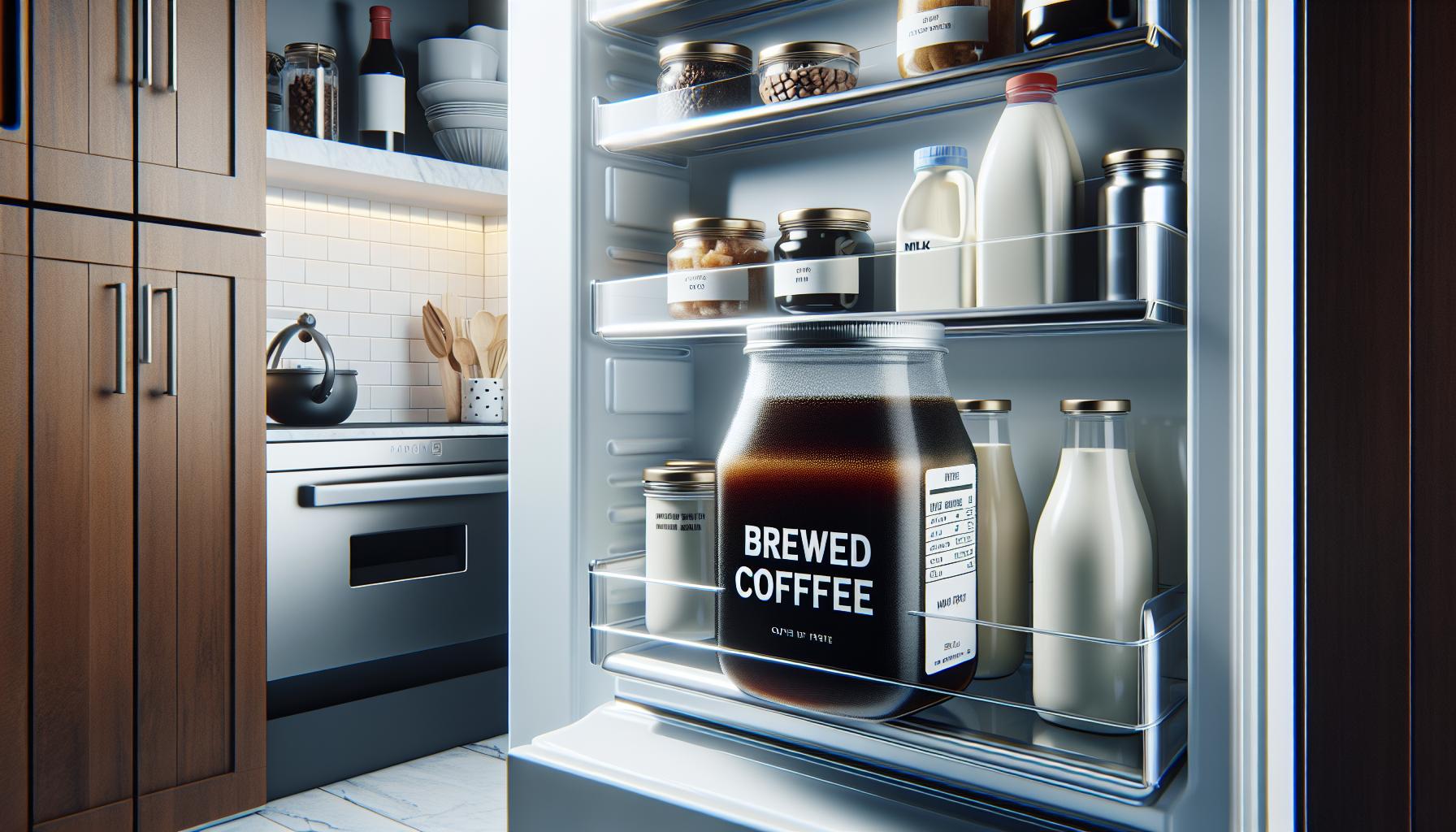
Best Practices for Storing Brewed Coffee in the Fridge
To maintain the rich flavor and aroma of your brewed coffee while storing it in the fridge, it’s essential to follow a few simple yet effective practices. One of the most critical steps is to ensure that your coffee is stored in an airtight container. This practice minimizes oxidation, which occurs when coffee is exposed to air, leading to a stale taste. Using a container that does not allow light to penetrate is also beneficial, as ultraviolet rays can deteriorate the quality of the coffee over time.
Another important consideration is the temperature at which you store your coffee. Place your container in the coldest part of your refrigerator, usually at the back, to maintain a consistent temperature. Avoid storing brewed coffee in the door, which experiences temperature fluctuations whenever the door is open. For maximum freshness, aim to consume refrigerated brewed coffee within 3 to 4 days. After this period, the risk of spoilage increases, compromising both safety and flavor.
Additionally, be aware that adding ingredients like milk or sugar to your coffee can significantly impact its shelf life. If possible, store brewed coffee plain and add any desired ingredients just before consumption. This approach not only keeps the coffee fresh longer but also allows for greater flexibility in your coffee experience. Following these best practices ensures that your coffee remains enjoyable and safe to drink, even when stored in the fridge.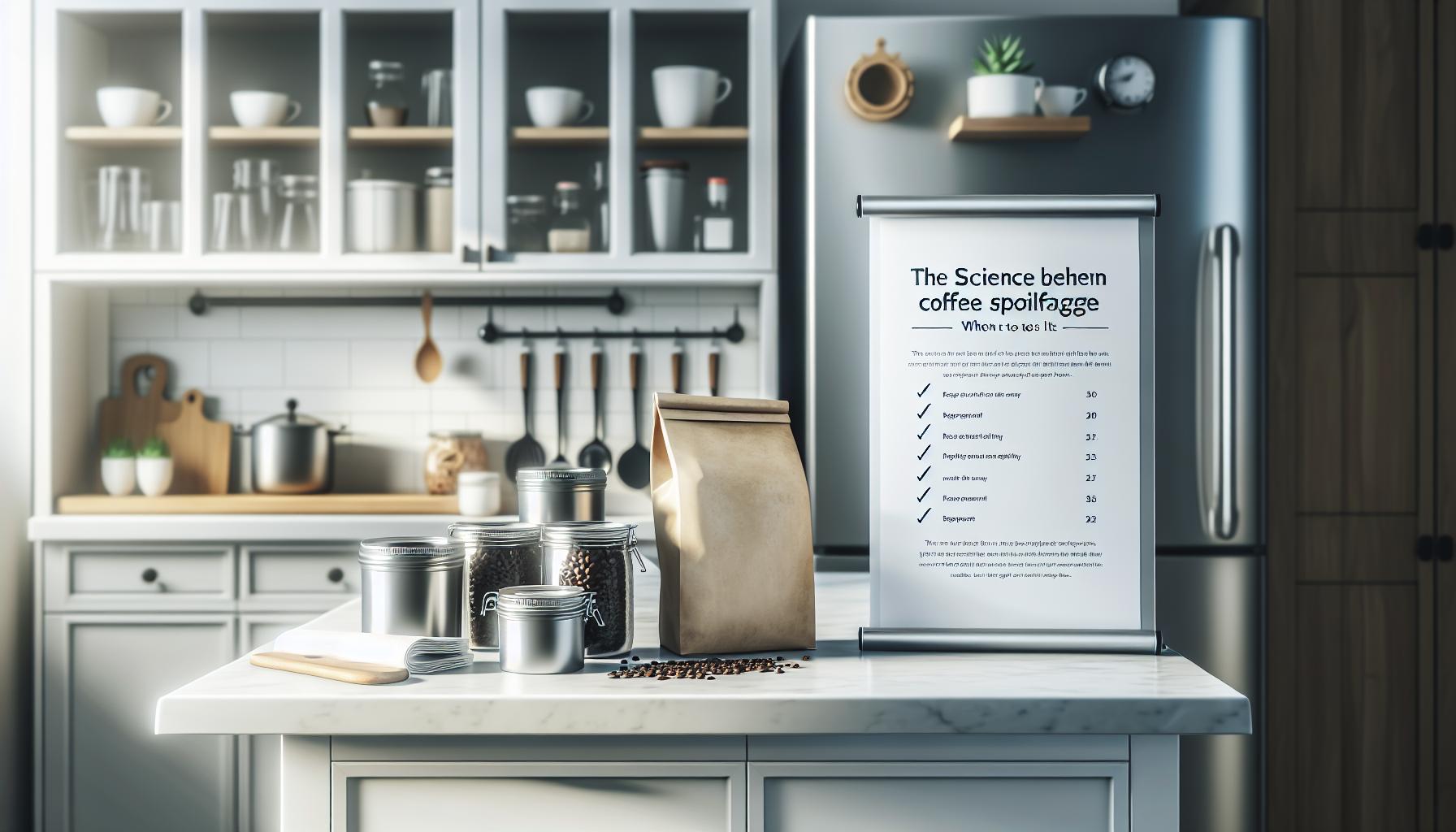
The Science Behind Coffee Spoilage: When to Toss It
Brewed coffee, while a beloved beverage, is not a product that lasts indefinitely. Understanding the science of coffee spoilage can help ensure you enjoy your drink at its best and avoid any unpleasant surprises. Coffee contains oils and organic compounds that, after brewing, begin a slow degradation process. This aging is accelerated by exposure to heat, light, and air. Consequently, brewed coffee should ideally be consumed within a few days to preserve its quality and safety.
Once brewed, coffee typically remains fresh in the fridge for about 3 to 4 days. Beyond this period, you may notice differences in taste, aroma, and overall quality. The development of sour or rancid flavors signals that it’s time to toss out your coffee. These changes occur due to oxidation and potential bacterial growth, especially if any additives like milk or sugar are included, which can spoil more quickly than plain coffee.
When evaluating whether your refrigerated coffee is still good to drink, rely on your senses. Here are some signs that your coffee has gone bad:
- Off Smell: If your coffee has a sour or rotten odor, it’s best to discard it.
- Unpleasant Taste: A bitter, rancid, or otherwise off flavor indicates spoilage.
- Separation: If you see unusual separation of oils or a change in consistency, that’s a red flag.
Additionally, if your coffee was left out at room temperature for more than 2 hours, it should be thrown away, as bacteria can proliferate quickly at unsafe temperatures. By following these guidelines, you can safely enjoy your coffee and ensure you get the best flavor possible with each cup.
Signs Your Fridge-Stored Coffee Has Gone Bad
Brewed coffee is a delightful staple for many, but it’s crucial to recognize when it has passed its prime. Freshness isn’t just about flavor; it’s also about safety. As coffee ages in the fridge, a few telltale signs indicate that it may no longer be enjoyable or safe to consume. Being aware of these signs can help you avoid a less-than-pleasant sip and ensure that every cup you drink is fresh and delicious.
One of the most apparent signs that your coffee has gone bad is an off smell. If, upon opening the container, you detect a sour or rotten odor, it’s a clear indicator that spoilage has occurred. Additionally, if you taste the coffee and find that it has an unpleasant flavor, such as a bitter, rancid, or somehow altered taste, it’s time to dispose of it. Moreover, if you notice unusual separation of oils or a change in its consistency, such as a film forming on the surface, these are red flags that your coffee may no longer be safe to drink.
While brewed coffee typically remains fresh for about three to four days in the refrigerator, factors like exposure to air and the addition of ingredients like milk or sugar can accelerate spoilage. If your coffee has been left out at room temperature for more than two hours, it is recommended you throw it away, as bacteria can thrive in warmer conditions. Paying attention to these signs not only maximizes your enjoyment of coffee but also helps ensure your health and safety.
Reheating Coffee: Tips for Best Flavor Retention
When it comes to enjoying a second cup of coffee, reheating can often lead to diminished flavor and aroma. However, there are effective strategies to preserve the coffee’s freshness and enhance your tasting experience. Reheating brewed coffee improperly can cause a bitter taste due to the release of oils and compounds that were mellowed in the initial brew. Therefore, how you reheat it is just as crucial as your initial preparation.
To maintain the best flavor when reheating coffee, the method you choose can make a significant difference. The microwave is a convenient choice, but it’s crucial to reheat it in short intervals-around 20 to 30 seconds at a time. This allows for more even heating and reduces the risk of overboiling, which can exacerbate bitterness. If possible, use a microwave-safe ceramic mug, as plastics can sometimes impart off-flavors. Stirring the coffee after each interval helps distribute the heat evenly, further preventing the coffee’s flavor profile from turning undesirable.
Alternatively, using a stovetop on low heat can be an even better option. When reheating on the stove, pour the coffee into a saucepan and heat gently, stirring often. This method helps to keep the coffee’s essential oils intact, preserving more of the flavors that you enjoy. Aim for a temperature of around 150°F (65°C) for optimal enjoyment without the risk of scalding.
It’s essential to remember that while reheating can extend your coffee enjoyment, brewed coffee should ideally be consumed within a few days of being made. Freshness is paramount, so consider preparing smaller batches if you’re only sipping occasionally. If you follow these tips for reheating, you can enjoy your coffee while retaining much of its original character, making each cup a delightful experience.
Using Leftover Coffee: Creative Recipes and Ideas
Using leftover brewed coffee opens up a world of culinary creativity beyond simply reheating your morning cup. Unlike other beverages that have a more limited shelf life, brewed coffee can last in the fridge for about three to four days when stored properly. This timeframe allows for various delicious uses that can transform stale coffee into tasty treats.
One popular method is incorporating leftover coffee into baking recipes. It adds depth and richness to chocolate cakes and brownies, enhancing the flavor without overpowering the sweetness. Simply substitute brewed coffee for water or milk in your favorite recipe. For example, replace half of the liquid in a chocolate cake recipe with an equal amount of leftover brewed coffee to intensify the chocolate flavor and create a moister texture.
Additionally, coffee can be an excellent base for smoothies. Combine chilled brewed coffee with frozen bananas, a splash of milk or a milk alternative, and a dollop of nut butter for a quick and energizing breakfast option. If you’re looking for a refreshing drink, blend brewed coffee with ice, milk, and a sweetener of your choice for a homemade iced coffee treat that rivals your local café.
For those interested in exploring savory flavors, try using coffee in marinades or sauces. A coffee-infused barbecue sauce can elevate grilled meats, while a coffee reduction can add a unique twist to steak or vegetables. Simply simmer leftover coffee with spices and herbs to create a flavorful glaze that enhances your dishes.
Overall, the possibilities with leftover coffee are limited only by your imagination. Before you plunge into your culinary experiments, remember to give your coffee a smell and a taste test before using it, ensuring it hasn’t gone bad. If it has developed an off aroma or taste, it’s best to discard it. Embrace the world of coffee beyond your cup, and enjoy experimenting with these innovative uses!
Unbrewed Coffee Storage: Tips for Whole Beans and Grounds
Storing coffee properly can significantly influence its flavor and freshness, ensuring you enjoy the best cup every time. Whole beans and ground coffee have their own optimal storage techniques to maintain their aromatic qualities and avoid spoilage. The goal is to keep the beans or grounds away from elements that can degrade their quality, such as light, heat, moisture, and air.
To start, always store coffee in an airtight container. This is crucial because exposure to air can lead to oxidation, which diminishes flavor. While coffee bags often come with a one-way valve, transferring the coffee to a sealed glass or ceramic container offers even better protection. Keep the container in a cool, dark place-ideally a pantry or cupboard-away from direct sunlight and heat sources. For added safety, consider adding a desiccant packet to absorb any excess moisture.
For those who prefer to buy whole beans and grind them as needed, aim for a storage duration of about two weeks to a month for optimal freshness. Beyond this period, although the coffee will still be safe to consume, the flavor profile may start to decline. If you purchase pre-ground coffee, use it within one to two weeks after opening for the best taste. Always check the roast date on the bag; fresher is better.
If you intend to store coffee for an extended period, freezing is an effective method. Place the coffee in airtight freezer bags, squeezing out as much air as possible before sealing. Aim to portion your coffee to avoid repeated thawing, which can introduce moisture. Coffee can remain at peak quality in the freezer for up to six months. When ready to use, thaw at room temperature to retain flavors without introducing condensation.
By following these straightforward storage practices, you can effectively extend the life of your coffee, ensuring that each brew tastes just as delightful as the day it was roasted.
How to Freeze Coffee for Long-Term Storage
Freezing coffee is an excellent way to preserve its freshness and flavor over extended periods, making it a practical solution for coffee lovers who want to keep their favorite beans in top condition. When done correctly, frozen coffee can maintain its best quality for up to six months, providing a delightful cup even months after purchase. However, understanding the right techniques for freezing and thawing is essential to prevent any deterioration in taste or aroma.
To freeze your coffee effectively, start by selecting the right type. Whole beans retain flavor better than ground coffee; thus, if possible, opt for whole beans. Divide your desired quantity into smaller portions, typically enough for one or two brews each. This strategy avoids multiple freeze-thaw cycles, which can introduce moisture and negatively impact flavor. Next, place each portion in airtight freezer bags, ensuring to squeeze out as much air as possible to minimize oxidation. For extra protection, you can also wrap the bags in aluminum foil or place them in a vacuum-sealed container.
When you’re ready to use your frozen coffee, it’s crucial to thaw it correctly. Avoid thawing coffee in a microwave or heat source, as this can lead to uneven moisture distribution and alteration of flavor. Instead, allow the coffee to sit at room temperature in its sealed bag for several hours or overnight. This method helps the coffee thaw slowly while retaining its aromatic qualities. If using coffee grounds, it’s best to grind them while still frozen for the freshest results, as this can help minimize the exposure to air.
Following these steps ensures that you can enjoy the delightful flavors of your favorite coffee long after you’ve initially purchased it. By mastering the art of freezing coffee, you can indulge in a consistently fresh brew regardless of when you decide to enjoy it.
Safety Considerations: When is Coffee Unsafe to Drink?
Brewed coffee can be a delicious fuel for your day, but it’s essential to recognize when it has gone past its safe-to-drink point. Generally, brewed coffee that has been stored in the fridge is best consumed within three to four days. After this period, the risk of spoilage increases, and taste and safety begin to decline. Understanding when your coffee is unsafe involves knowing the signs of spoilage and the conditions that promote bacterial growth.
Unlike dry coffee beans, brewed coffee is perishable and can harbor bacteria when left too long. If you see any mold forming on the surface or notice a sour smell, it’s a clear indication that the coffee is no longer safe to drink. Bacteria thrive in warm, moist environments, and storing your coffee in the fridge does not completely stop the potential for microbial growth over time. Therefore, always give your coffee a sniff and visual inspection before consumption.
Additionally, storage practices play a crucial role in maintaining coffee’s safety. Ensure that your coffee is stored in an airtight container to reduce exposure to air, which can accelerate spoilage. Without proper sealing, your coffee could also absorb odors from your refrigerator, leading to unwanted flavors. Over time, the quality of the brew degrades, not limiting itself to just taste but also making it less appealing for consumption.
When in doubt, it’s better to err on the side of caution. If your coffee has been in the refrigerator for more than a week, or if you have any doubts about its smell or appearance, it’s best to toss it. Enjoy freshly brewed coffee where possible, and remember that safety and flavor go hand in hand!
Comparing Storage Methods: Fridge vs. Freezer vs. Counter
Understanding how to store brewed coffee effectively can make a significant difference in taste and safety. When comparing storage methods-fridge, freezer, and counter-each has distinct advantages and limitations that can affect the quality of your coffee over time.
Storing brewed coffee in the fridge is a common practice, primarily for its convenience. However, while refrigeration can prolong freshness a bit, the general rule is that it should be consumed within three to four days. To maximize the shelf life in the fridge, pour your coffee into an airtight container to prevent it from absorbing fridge odors and minimize exposure to air, which can degrade flavor. Despite best practices, keep in mind that bacteria can still develop, so always check for changes in smell or taste before consuming.
On the other hand, freezing brewed coffee is less common but can be a great option for long-term storage. If you freeze your coffee, consider pouring it into ice cube trays to create easily portioned servings for use in recipes or iced coffee. Frozen coffee can maintain its integrity for up to two months, but remember to seal it well in freezer-safe containers or bags to avoid freezer burn. When you’re ready to use it, thaw in the fridge and consume within a couple of days to enjoy the best flavor.
Leaving brewed coffee out on the counter is generally not recommended, as room temperature can accelerate spoilage. While it may be safe for a short period-as in the case of a few hours-it should never be kept there overnight. If coffee is left at room temperature for more than four hours, it’s wise to dispose of it. Bacteria thrive in warmer conditions, and the cozy warmth of your kitchen can make your coffee a breeding ground for unwanted microorganisms.
In summary, prioritize refrigeration when short-term storage is needed, reserve freezing for longer-lasting solutions, and avoid counter storage unless enjoying your coffee immediately. Knowing which method suits your needs can enhance your coffee experience while keeping safety in mind.
Maximizing Freshness: Daily Habits for Coffee Lovers
To keep your brewed coffee tasting fresh and flavorful, incorporating daily habits into your coffee routine can make a significant difference. Coffee enthusiasts know that quality is paramount, and small adjustments can help maintain that coveted taste. One key habit is to focus on brewing the right amount. Instead of making a large pot that might sit unused, consider brewing smaller batches to ensure you consume everything while it’s at its best. This reduces the need for leftover storage and helps you enjoy coffee at peak freshness every time.
Investing in quality storage containers is another wise move. Airtight containers prevent the absorption of odors and moisture, which can dramatically impact flavor. Use glass or ceramic containers rather than plastic, which may retain smells over time, altering the essence of your coffee. Additionally, label containers with the brew date to track freshness easily. If you’re refrigeration leftovers, make sure to cool the coffee to room temperature before sealing it in the fridge; this prevents condensation and keeps flavors intact.
Routine cleaning of your coffee equipment also plays a crucial role in maximizing freshness. Over time, oils from coffee beans can accumulate in grinders and brewing devices, leading to off-flavors. A simple maintenance practice is to clean your coffee maker and grinder weekly-using vinegar or specialized cleaning solutions-to keep everything running smoothly and maintain the clarity of flavor that your coffee deserves.
Lastly, be mindful of your coffee’s environment. Exposure to light and heat can degrade the quality of brewed coffee, so store your coffee in a cool, dark place, ideally in your fridge if you’re not consuming it right away. By establishing these consistent habits, you can significantly enhance the enjoyment of your daily brew while preserving its rich and inviting flavors.
Frequently Asked Questions
Q: How long does brewed coffee last in the fridge?
A: Brewed coffee can last in the fridge for about 3 to 4 days when stored properly in an airtight container. For optimal flavor, consume it within the first two days. Always check for any off smells or changes in color before drinking.
Q: Can you freeze brewed coffee and how long will it last?
A: Yes, you can freeze brewed coffee, which can last for up to 2 months. To freeze, pour it into ice cube trays or airtight containers. This method preserves flavor, but for the best taste, use the frozen coffee within a month.
Q: What’s the best way to reheat coffee without losing flavor?
A: To reheat coffee while retaining its flavor, use a stovetop method over low heat or a microwave at short intervals, stirring in between. Avoid boiling, as this can lead to bitterness. For detailed tips, refer to the “Reheating Coffee” section of the article.
Q: How can I tell if my fridge-stored coffee has gone bad?
A: Signs your coffee has gone bad include a sour smell, unusual discoloration, or a bitter taste. If you notice any of these changes, it’s best to discard it. This is discussed further in the “Signs Your Fridge-Stored Coffee Has Gone Bad” section.
Q: Is it safe to drink coffee that was left out overnight?
A: It’s generally not safe to consume coffee left out at room temperature for more than 2 hours. Bacteria can grow rapidly, making it risky. For safety tips and storage guidelines, check the “Safety Considerations” section.
Q: Can I add milk to my coffee before storing it in the fridge?
A: While you can add milk to coffee and store it in the fridge, it’s best to add milk just before drinking. Milk can spoil faster than coffee, which can affect the overall freshness and safety of the beverage.
Q: What are common mistakes people make when storing brewed coffee?
A: Common mistakes include storing coffee in non-airtight containers, keeping it in warm areas, or leaving it uncovered. These practices can lead to stale flavors and spoilage. Refer to the “Best Practices for Storing Brewed Coffee” section for effective storage tips.
Q: How can I use leftover coffee creatively?
A: You can use leftover coffee in various ways, such as making coffee ice cubes, adding it to smoothies, or using it in baking recipes. For more ideas, see the “Using Leftover Coffee” section in the article.
Concluding Remarks
To ensure your brewed coffee remains as fresh and flavorful as possible, remember that it is best consumed within three to four days when stored in the fridge. Avoid unnecessary waste by using airtight containers and labeling them with the date you brewed. If you have lingering questions about how to maximize coffee freshness or are curious about safe storage tips, check out our related guides on proper coffee storage and brewing methods.
Don’t let your coffee go to waste-take action today! Consider subscribing to our newsletter for expert tips and exclusive offers tailored just for coffee enthusiasts. Join our community by sharing your thoughts below and explore more content that keeps your coffee game strong. Remember, a little knowledge goes a long way in enjoying your favorite brew!

